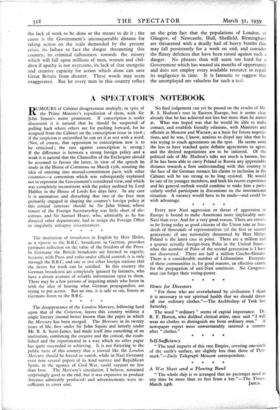A SPECTATOR'S NOTEBOOK
RUMOURS of Cabinet disagreement multiply, in spite of the Prime Minister's repudiation of them, with Sir John Simon's name prominent. If conscription is under discussion it is natural that he should be suspected of pulling back where others are for pushing forward, for he resigned from the Cabinet on the conscription issue in 1916 ; if the suspicion is unjustified he can set it at rest with a word. (Not, of course, that opposition to conscription now is to be criticised ; the case against conscription is strong.) If the difference is between a strong foreign policy and a weak it is natural that the Chancellor of the Exchequer should be assumed to favour the latter, in view of the speech he made in the House of Commons on March 15th, scouting the idea of entering into mutual-commitment pacts with other countries—a contention which was subsequently explained not to represent the Government's considered view, and which was completely inconsistent with the policy outlined by Lord Halifax in the House of Lords five days later. In any case it is anomalous and disturbing that two of the four men primarily engaged in shaping the country's foreign policy at this critical juncture should be Sir John Simon, whose tenure of the Foreign Secretaryship was little short of dis- astrous, and Sir Samuel Hoare, who, admirably as he has directed other departments, had to resign the Foreign Office in singularly unhappy circumstances.


































































 Previous page
Previous page